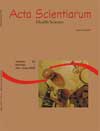<b>Efeito do tratamento com etanol sobre a gliconeogênese em ratos intolerantes à glicose</b> - DOI: 10.4025/actascihealthsci.v31i2.4653
Résumé
O objetivo deste trabalho foi avaliar a influência do tratamento com etanol (Et) sobre a gliconeogênese em ratos intolerantes à glicose. A intolerância à glicose foi induzida pela injeção de dexametasona (DEXA) (0,1 mg kg-1; s.c., quatro dias). O teste de tolerância à glicose (GTT) e os experimentos de perfusão de fígado in situ (avaliação da gliconeogênese) foram realizados em ratos submetidos a jejum de 15h dos grupos experimentais: Controle (salina 0,9%, s.c., quatro dias); DEX (DEXA 0,1 mg kg-1; s.c., quatro dias); DEX+Et 3% (per os, 14 dias); DEX+Et 20% (per os, 14 dias); DEX+Met (Mettformina 300 mg kg-1, per os, quatro dias). Os animais tratados com DEX apresentaram elevada concentração de glicose sanguínea e também no perfusato coletado. O tratamento com metformina promoveu redução significativa na concentração de glicose no perfusato obtido de animais intolerantes à glicose. Entretanto, somente o tratamento com Et 3% promoveu redução na intolerância à glicose, mas não na produção da glicose hepática observada em animais DEX. Os dados obtidos demonstram que a administração de Et 3% melhora a intolerância à glicose induzida pela DEX sem influenciar na gliconeogênese, diferentemente do observado pelo tratamento com a metformina.Téléchargements
DECLARAÇÃO DE ORIGINALIDADE E DIREITOS AUTORAIS
Declaro que o presente artigo é original, não tendo sido submetido à publicação em qualquer outro periódico nacional ou internacional, quer seja em parte ou em sua totalidade.
Os direitos autorais pertencem exclusivamente aos autores. Os direitos de licenciamento utilizados pelo periódico é a licença Creative Commons Attribution 4.0 (CC BY 4.0): são permitidos o acompartilhamento (cópia e distribuição do material em qualqer meio ou formato) e adaptação (remix, transformação e criação de material a partir do conteúdo assim licenciado para quaisquer fins, inclusive comerciais.
Recomenda-se a leitura desse link para maiores informações sobre o tema: fornecimento de créditos e referências de forma correta, entre outros detalhes cruciais para uso adequado do material licenciado.
























5.png)







